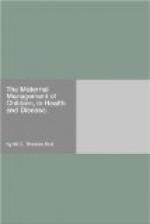The amount of suffering, too, may be greatly lessened by the thoughtful and discerning attentions of the mother. The wants and necessities of the young child must be anticipated; the fretfulness produced by disease, soothed by kind and affectionate persuasion; and the possibility of the sick and sensitive child being exposed to harsh and ungentle conduct, carefully provided against.
Again, not only is a firm and strict compliance with medical directions in the administration of remedies, of regimen, and general measures, necessary, but an unbiased, faithful, and full report of symptoms to the physician, when he visits his little patient, is of the first importance. An ignorant servant or nurse, unless great caution be exercised by the medical attendant, may, by an unintentional but erroneous report of symptoms, produce a very wrong impression upon his mind, as to the actual state of the disease. His judgment may, as a consequence, be biased in a wrong direction, and the result prove seriously injurious to the welldoing of the patient. The medical man cannot sit hour after hour watching symptoms; hence the great importance of their being faithfully reported. This can alone be done by the mother, or some person equally competent.
There are other weighty considerations which might be adduced here, proving how much depends upon efficient maternal management in the time of sickness; but they will be severally dwelt upon, when the diseases with which they are more particularly connected are spoken of.
Sect. 1.—Accidents and diseases which may occur to the infant at birth, or soon after.
STILL-BORN.
Sometimes the child comes into the world apparently dead, and, unless the most active exertions are made by the attendants, is lost. The superintendence of the means used devolves upon the medical man; but it would be often well if his assistants were already acquainted with the measures pursued under these circumstances, for they would be more likely to be carried into effect with promptitude and success, than they now frequently are. And again, the still-born child is frequently in this state from having been born very rapidly, and before the medical man can have arrived, it will be more especially useful in such a case, that the attendants in the lying-in-room should know how to proceed.
The various causes producing this condition it is unnecessary to mention.
The condition itself may exist in a greater or less degree: the infant may be completely stillborn, with no indication of life, except, perhaps, the pulsation of the cord, or a feeble action of the heart;—or it may make ineffectual efforts at breathing, or even cry faintly, and yet subsequently perish for want of strength to establish perfectly the process of respiration. Under all these circumstances, a




